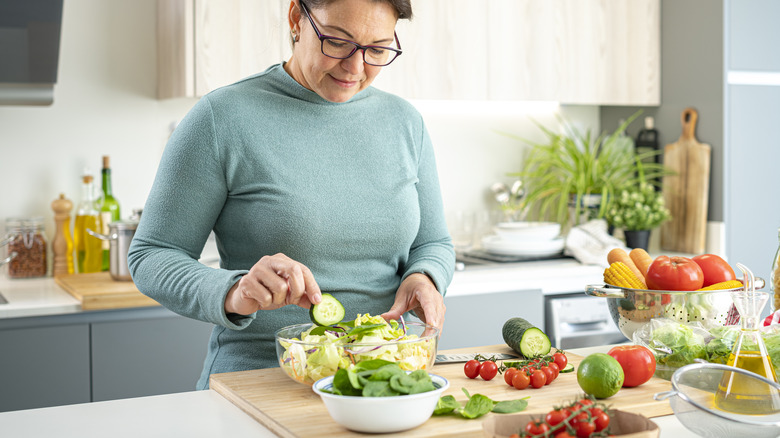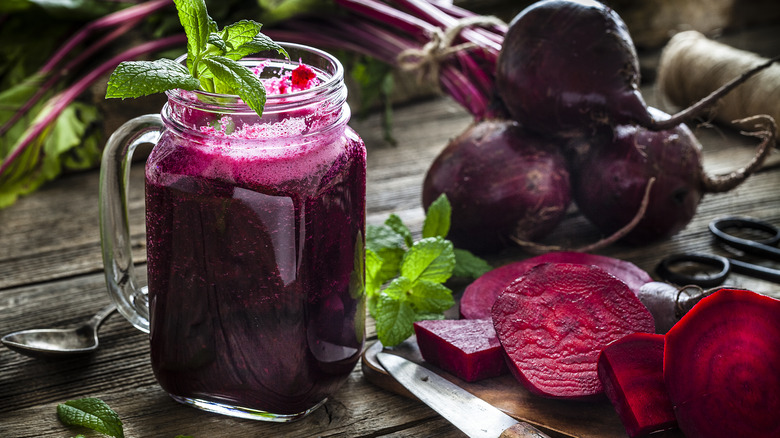Eat This Colorful Vegetable To Raise Your Good Cholesterol Levels
As the number of candles on your birthday cake increases each year, so do your cholesterol levels. You could do everything necessary to lower your cholesterol, such as quit smoking, reduce your alcohol consumption, and keep your weight at healthy levels. But you also know that your extra-large pepperoni pizza habit isn't going to lower your cholesterol.
You could lower your total cholesterol by raising the good cholesterol, the high-density lipoprotein (HDL) that scours the bad cholesterol from your blood and sends it to your liver. Moderate exercise boosts this HDL cholesterol if you get the recommended 150 minutes a week, but some foods also improve your HDL. Sorry, it's not pizza.
Beets might have been one of those vegetables that sat untouched on your plate when you were a kid, but beets have now emerged as a huge superfood. (If you don't like the slimy beets from a can, try this easy roasted beets recipe.) You've seen beets in your favorite juice bar, and athletes swear that beet juice helps with their athletic performance and recovery. Beets might also be one of the vegetables you could add back onto your plate to raise your good cholesterol.
Heart-healthy beets
A cup of raw beets has just 58 calories and 13 grams of carbohydrates. Don't be put off by the 9 grams of sugar because that same serving of beets has almost 4 grams of fiber and 2 grams of protein to slow digestion. Beets are also a good source of potassium, with 442 milligrams. If you're dehydrated, beets can help because they're 88% water. The 148 micrograms of folate (vitamin B9) work with other B vitamins to protect your heart from disease and stroke.
A 2011 study in Farmacia explored the role of beetroot extract on cholesterol and oxidative stress in rats. After feeding the rats a high-cholesterol diet for 10 weeks, the researchers then gave them beetroot extract for 70 days. The beetroot extract lowered LDL cholesterol and triglycerides, increased HDL cholesterol, and reduced cholesterol-linked oxidative stress.
If you're not a fan of beets, you could turn to beetroot juice to boost your HDL cholesterol. A 2015 study in the Journal of Pharmacy and Nutrition Sciences looked at how drinking beetroot juice for two weeks impacts cholesterol, oxidative stress, and body composition. Beetroot juice increased HDL cholesterol, lowered LDL cholesterol, improved the body's antioxidant capacity, and lowered cortisol levels. You should also know that when you drink beetroot juice every day, you might notice some red or pink in your urine or stool.
Other benefits of beets
You'll also want to add more beets to your diet for other health benefits, according to a 2021 article in Food Science and Nutrition. Beets are rich in antioxidants such as betanin, which can slow down the growth of cancerous tumors or cut off their blood supply. Beetroot can also make cancer cells more sensitive to chemotherapy, reducing the chemotherapy dosage and decreasing side effects.
The nitrate in beetroot can lower your blood pressure because it improves the function of your blood vessels. These same nitrates can also improve blood flow to your brain to boost cognitive function in older adults. Beetroot might also protect your liver by activating protective enzymes and lowering oxidative stress.
You'll also find beets and beetroot in supplements and sports drinks to boost exercise performance. Although the research is mixed, some studies have found beetroot juice to improve your power and reduce fatigue in high-intensity exercise and sprints. Beetroot might also speed the delivery of oxygen during high-intensity workouts.



